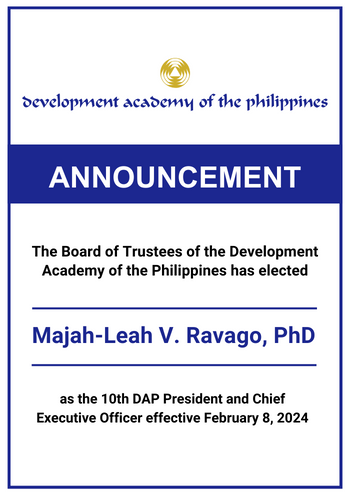The Center for Governance of the Development Academy of the Philippines concluded the lecture series on socio-political and economic perspectives under the Capability Building on Innovative Leadership for Legislative Staff (CBILLS) Program last May 24, with “Data Analytics and Other Trends in Knowledge Management in the Public Sector” serving as the third and final installment of the series at the Andaya Hall of the House of Representatives in Constitutional Hills, Quezon City.
Atty. Cesar S. Pareja, the secretary general of the House of Representatives, graced the event and welcomed the participants. Atty. Pareja expressed the hope that the participants would learn new trends on data analytics and knowledge management, which he said will help support the current administration in its pursuit of improving spending plans, project estimates and implementation, and expected accomplishments of the national government.
Experts invited to present lectures during the session came from the Philippine Statistics Authority. Director Divina Gracia L del Prado, officer-in-charge and assistant national statistician of the Economic Sector Statistics Service, covered the subjects on data analytics and data storytelling, while Knowledge Management and Communication Division Chief Simonette A. Nisperos discussed the principles and best practices in knowledge management.
The lecture was attended by representatives of the Legislative Budget Research and Monitoring Office of the Senate headed by Director General Yolanda D. Doblon, the Committee on Appropriations of the House of Representatives led by Director Julieta R. Apostol, the Office of Congressman Karlo Alexei B. Nograles and the Congressional Policy and Budget Research Department.
The lecture series on socio-political and economic perspectives, which aims to promote the discipline of long-term planning among the legislative staff and provide them a venue for discussing strategic issues that impact socio-political and economic governance, is under the CBILLS Program, which was designed to capacitate senior executives, managers and technical staff members of both the Senate and House of Representatives in leadership and management skills. Implemented by the DAP, the program was conceived after Congress identified education and training capability building as a necessary intervention to ensure that members of the legislative staff are able to effectively assist in the lawmaking functions of the country’s legislators. The program targetted 70 participants capacitated in management and leadership skills within the year. – Elluz Macalinao




